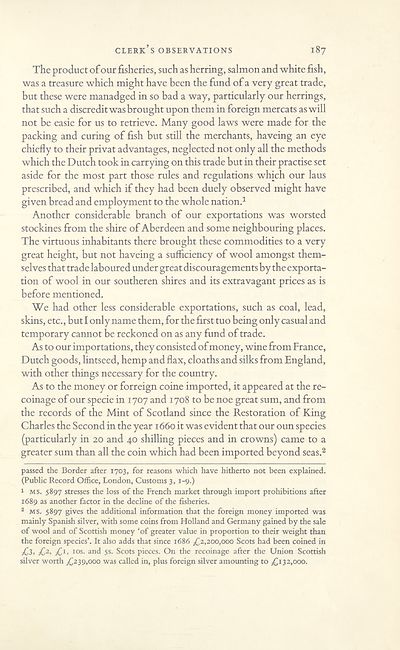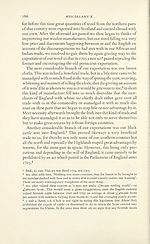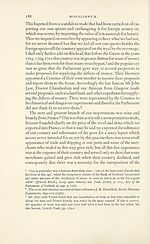Series 4 > Miscellany of the Scottish History Society
(212) Page 187
Download files
Complete book:
Individual page:
Thumbnail gallery: Grid view | List view

clerk’s observations
187
The product of our fisheries, such as herring, salmon and white fish,
was a treasure which might have been the fund of a very great trade,
but these were manadged in so bad a way, particularly our herrings,
that such a discredit was brought upon them in foreign mercats as will
not be easie for us to retrieve. Many good laws were made for the
packing and curing of fish but still the merchants, haveing an eye
chiefly to their privat advantages, neglected not only all the methods
which the Dutch took in carrying on this trade but in their practise set
aside for the most part those rules and regulations which our laus
prescribed, and which if they had been duely observed might have
given bread and employment to the whole nation.1
Another considerable branch of our exportations was worsted
stockines from the shire of Aberdeen and some neighbouring places.
The virtuous inhabitants there brought these commodities to a very
great height, but not haveing a sufficiency of wool amongst them¬
selves that trade laboured under great discouragements by the exporta¬
tion of wool in our southeren shires and its extravagant prices as is
before mentioned.
We had other less considerable exportations, such as coal, lead,
skins, etc., but I only name them, for the first tuo being only casual and
temporary cannot be reckoned on as any fund of trade.
As to our importations, they consisted of money, wine from France,
Dutch goods, lintseed, hemp and flax, cloaths and silks from England,
with other things necessary for the country.
As to the money or forreign coine imported, it appeared at the re¬
coinage of our specie in 1707 and 1708 to be noe great sum, and from
the records of the Mint of Scotland since the Restoration of King
Charles the Second in the year 1660 it was evident that our oun species
(particularly in 20 and 40 shilling pieces and in crowns) came to a
greater sum than all the coin which had been imported beyond seas.2
passed the Border after 1703, for reasons which have hitherto not been explained.
(Public Record Office, London, Customs 3, 1-9.)
1 ms. 5897 stresses the loss of the French market through import prohibitions after
1689 as another factor in the decline of the fisheries.
2 ms. 5897 gives the additional information that the foreign money imported was
mainly Spanish silver, with some coins from Holland and Germany gained by the sale
of wool and of Scottish money ‘of greater value in proportion to their weight than
the foreign species’. It also adds that since 1686 £2,200,000 Scots had been coined in
£3, £2, £1, 1 os. and 5s. Scots pieces. On the recoinage after the Union Scottish
silver worth £239,000 was called in, plus foreign silver amounting to £132,000.
187
The product of our fisheries, such as herring, salmon and white fish,
was a treasure which might have been the fund of a very great trade,
but these were manadged in so bad a way, particularly our herrings,
that such a discredit was brought upon them in foreign mercats as will
not be easie for us to retrieve. Many good laws were made for the
packing and curing of fish but still the merchants, haveing an eye
chiefly to their privat advantages, neglected not only all the methods
which the Dutch took in carrying on this trade but in their practise set
aside for the most part those rules and regulations which our laus
prescribed, and which if they had been duely observed might have
given bread and employment to the whole nation.1
Another considerable branch of our exportations was worsted
stockines from the shire of Aberdeen and some neighbouring places.
The virtuous inhabitants there brought these commodities to a very
great height, but not haveing a sufficiency of wool amongst them¬
selves that trade laboured under great discouragements by the exporta¬
tion of wool in our southeren shires and its extravagant prices as is
before mentioned.
We had other less considerable exportations, such as coal, lead,
skins, etc., but I only name them, for the first tuo being only casual and
temporary cannot be reckoned on as any fund of trade.
As to our importations, they consisted of money, wine from France,
Dutch goods, lintseed, hemp and flax, cloaths and silks from England,
with other things necessary for the country.
As to the money or forreign coine imported, it appeared at the re¬
coinage of our specie in 1707 and 1708 to be noe great sum, and from
the records of the Mint of Scotland since the Restoration of King
Charles the Second in the year 1660 it was evident that our oun species
(particularly in 20 and 40 shilling pieces and in crowns) came to a
greater sum than all the coin which had been imported beyond seas.2
passed the Border after 1703, for reasons which have hitherto not been explained.
(Public Record Office, London, Customs 3, 1-9.)
1 ms. 5897 stresses the loss of the French market through import prohibitions after
1689 as another factor in the decline of the fisheries.
2 ms. 5897 gives the additional information that the foreign money imported was
mainly Spanish silver, with some coins from Holland and Germany gained by the sale
of wool and of Scottish money ‘of greater value in proportion to their weight than
the foreign species’. It also adds that since 1686 £2,200,000 Scots had been coined in
£3, £2, £1, 1 os. and 5s. Scots pieces. On the recoinage after the Union Scottish
silver worth £239,000 was called in, plus foreign silver amounting to £132,000.
Set display mode to:
![]() Universal Viewer |
Universal Viewer | ![]() Mirador |
Large image | Transcription
Mirador |
Large image | Transcription
Images and transcriptions on this page, including medium image downloads, may be used under the Creative Commons Attribution 4.0 International Licence unless otherwise stated. ![]()
| Scottish History Society volumes > Series 4 > Miscellany of the Scottish History Society > (212) Page 187 |
|---|
| Permanent URL | https://digital.nls.uk/126695427 |
|---|
| Description | Over 180 volumes, published by the Scottish History Society, containing original sources on Scotland's history and people. With a wide range of subjects, the books collectively cover all periods from the 12th to 20th centuries, and reflect changing trends in Scottish history. Sources are accompanied by scholarly interpretation, references and bibliographies. Volumes are usually published annually, and more digitised volumes will be added as they become available. |
|---|


